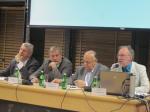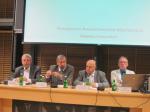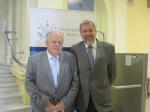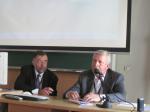European change strategy for Belarus
28- 16.07.2013, 8:45
- 25,783
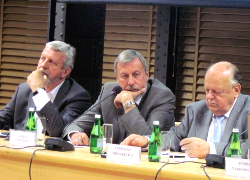
Europe should stop flirting with Lukashenka and create more opportunities for the citizens of Belarus.
Well-known Belarusian politicians spoke about that at an international conference in the Polish capital.
It started at Warsaw University on 15 July and will last for 3 days. It is the 10th East European conference ‘Over the barriers’. It was opened by the director of the Institute for East European Studies of Warsaw University and of the Kastus Kalinouski scholarship program Jan Malicki.
Well-known Belarusian and Polish politicians and civil activists are taking part in the event, including the leader of the European Belarus civic campaign Andrei Sannikov, first head of independent Belarus Stanislau Shushkievich, the head of the Movement for Freedom Aliaksandr Milinkievich, the head of the Belarusian analytical workshop Andrej Vardamatski, deputy Foreign Minister of Poland Artur Novak, former Polish ambassador to Belarus Mariusz Maszkievicz.
A round table discussion on the topic ‘Belarus today: stabilization vs. destabilization’ took place on the first day of the conference. It was conducted by Kazimierz Wujticki – a historian and journalist, a professor of the Center for East European Studies of Warsaw University. Its participants discussed the EU’s Belarusian policy.
The leader of the European Belarus civic campaign Andrei Sannikov highlighted that Europe needs a single strategy towards our country.
“Belarusian topic is not just present at the conference. Several events are devoted to it.
First, there was a session on Belarus in the transition period, I led the section on the Eastern Partnership, Belarus’ participation in which is widely discussed today. A round table on the problems of Belarus took place. There will be separate reports on Belarus too. In particular, one of them is titled ‘Poland’s assistance to the democratization of Ukraine and Belarus”. It is very important that the Belarusian topic does not just remain in the discourse, it reaches a serious academic level. In regards to that, I would like to thank Warsaw University for the attention to our country and the director of the Center for East European Studies Jan Malicki, who pays close attention to the topic.
As to the round table, there was a good discussion. It could be seen that all the participants were mostly united in the opinion that Belarus needed changes. And despite the fact that we stick to different positions, in general, we tried to communicate the same idea – Belarus is a European country, rapprochement with Europe if favorable for Belarus, the dictatorship is the obstacle for the rapprochement, reforms are needed, there is not always understanding on the part of European partners, assistance to the youth is necessary and to the citizens of Belarus. I said that the dictatorship should be treated as a dictatorship, it must be given no advances. Europe should stop flirting with Lukashenka and create more opportunities for the citizens of Belarus. Poland may serve as an example for that. After 2010 education opportunities were increased here for Belarusian students, a graduate program was launched. Already today the EU can unilaterally introduce free visas for Belarusians.
A number of questions related to the maturity of the civil society and its capabilities to mobilize and stand for its rights. All the participants agreed that the citizens of Belarus stand for changes. I, for example, believe that the majority is against the dictatorial regime of Lukashenka in Belarus.
Andrej Vardamatski provided interesting data: according to sociological surveys, the lowest percentage of willingness to participate in protest actions, around 5%, was registered in December 2010, which means exactly in the period, when one of the largest protest actions took place in Belarus. These data shows that sociological surveys cannot be a barometer of public sentiment in a dictatorship, and also that the discontent with the regime can lead to significant protest actions any moment.
There has long been a favorable situation for the change of the political system in Belarus. The understanding of what needs to be done and a strategy for such actions, aimed at the change of the regime, and also the mutual understanding with the European Union are needed for changes to happen”, - Andrei Sannikov said in an interview to the charter97.org web-site as the round table ended.
The first head of independent Belarus Stanislau Shushkievich criticized the European Union for having its policy towards official Minsk not always coherent.
“When Belarus runs out of money, it is Russia that saves it. But what is the most interesting is that Europe does in from time to time too. First it puts forward 4 conditions, then 12, and then Javier Solana comes and almost kisses Lukashenka”, - he emphasized when answering to the question of what helps the Belarusian regime to stay in power.
The leader of the Movement for Freedom Aliaksandr Milinkievich compared the situation in Belarus to the events that led to the Arab Spring and the change of regimes in several countries in North Africa.
“There is a problem in Belarus, that there are no real elections, and one can only win by the means of a revolution, which was attempted several times. I think, that in the conditions of a tough authoritarianism one cannot lead a large number of people to the streets by only appealing to moral principles. The revolutions in North Africa were economic revolutions. Our protests were of moral nature, people did not come out in the streets for bread. And something else: in Georgia and Ukraine there were oppositionists in the parliament, and in Belarus there are none. That is why it is not easy to implement such a scenario. I think, a revolution could happen, but I would like it not to be bloody”, - he stated.



